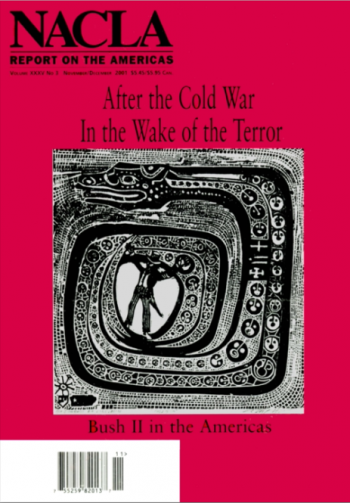Report
Kate Doyle & Adam Isacson
The smoke has mostly cleared over the Pentagon and the wreckage of New York City’s World Trade Center, yet an image of our new new world order has yet to emerge. In the wake of the terrorist attack on the United States, U.S. defense and security policy in the hemisphere and around the globe takes on an unpredictable and potentially ugly demeanor.
Although the former Texas governor promised to forge a new and special relationship with Latin America during his presidential campaign, Bush hijo has named a slate of dedicated Cold Warriors to fill many of his government’s most senior policy positions that affect Latin America.
Since President Ronald Reagan announced his commitment to the promotion of democracy in a speech to the British Parliament in 1982, there has been a bipartisan consensus in Washington that the United States should promote democracy abroad.
When Presidents Vicente Fox and George W. Bush got together last February at Fox’s Guanajuato hacienda, the two let it be known that an important shift was in the works in U.S.-Mexico relations—immigration policy in particular. Several months later, during Fox’s September state visit to Washington, the two presidents set forth principles from which further negotiations might proceed; they have suggested that they hoped to reach an agreement by the end of the year.
The Andean region—Colombia, Ecuador, Peru and Bolivia—has, since the 1980s, been the main theatre of action in the drug war; before September 11 President Bush Junior had been expanding that war with an "Andean Initiative" reminiscent of his father’s strategy of more than a decade ago.
Kenneth E. Sharpe & William Spencer
Within days following September 11, the international chorus of heartfelt concern for the victims and their families was followed by troubling and calculated moves for advantage by advocates of measures which could serve to escalate the war on drugs.
What—according to U.S. officials—is the face of terrorism in Latin America? What role is Latin America likely to play in a world-wide, U.S.-directed “war on terrorism”?
Markets do not exist as gifts from the gods. They are created by people. In part, they are constructed and shaped as the unintended consequences of innumerable human actions and arrangements—wars and revolutions, informal social customs and formal legal structures, schooling and technological innovations.
There is some evidence that in the current era of globalization, which is being organized more and more according to free trade policies, there is rising inequality in the distribution of income both within and between countries.

